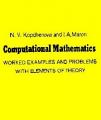
Iterative Methods for Sparse Linear Systems
by Yousef Saad
Publisher: PWS 1996
ISBN/ASIN: 0898715342
Description:
The book gives an in-depth, up-to-date view of practical algorithms for solving large-scale linear systems of equations. These equations can number in the millions and are sparse in the sense that each involves only a small number of unknowns. The methods described are iterative, i.e., they provide sequences of approximations that will converge to the solution.
Download or read it online for free here:
Download link
(multiple formats)
Similar books
 Handbook of Mathematical Functions
Handbook of Mathematical Functionsby M. Abramowitz, I. A. Stegun - GPO
Students and professionals in the fields of mathematics, physics, engineering, and economics will find this reference work invaluable. A classic resource for special functions, standard trig, and exponential logarithmic definitions and extensions.
(32923 views)
 First Semester in Numerical Analysis with Julia
First Semester in Numerical Analysis with Juliaby Giray Ökten - Florida State University
The book presents the theory and methods, together with the implementation of the algorithms using the Julia programming language. The book covers computer arithmetic, root-finding, numerical quadrature and differentiation, and approximation theory.
(6491 views)
 Numerical Solutions of Engineering Problems
Numerical Solutions of Engineering Problemsby K. Nandakumar - University of Alberta
Contents: On mathematical models; Single nonlinear algebraic equation; System of linear and nonlinear algebraic equations; Numerical differentiation and integration; Ordinary differential equations; Boundary value problems; etc.
(15570 views)
 Computational Mathematics for Differential Equations
Computational Mathematics for Differential Equationsby N. V. Kopchenova, I. A. Maron
This is a manual on solving problems in computational mathematics. The book is intended primarily for engineering students, but may also prove useful for economics students, graduate engineers, and postgraduate students in the applied sciences.
(18525 views)